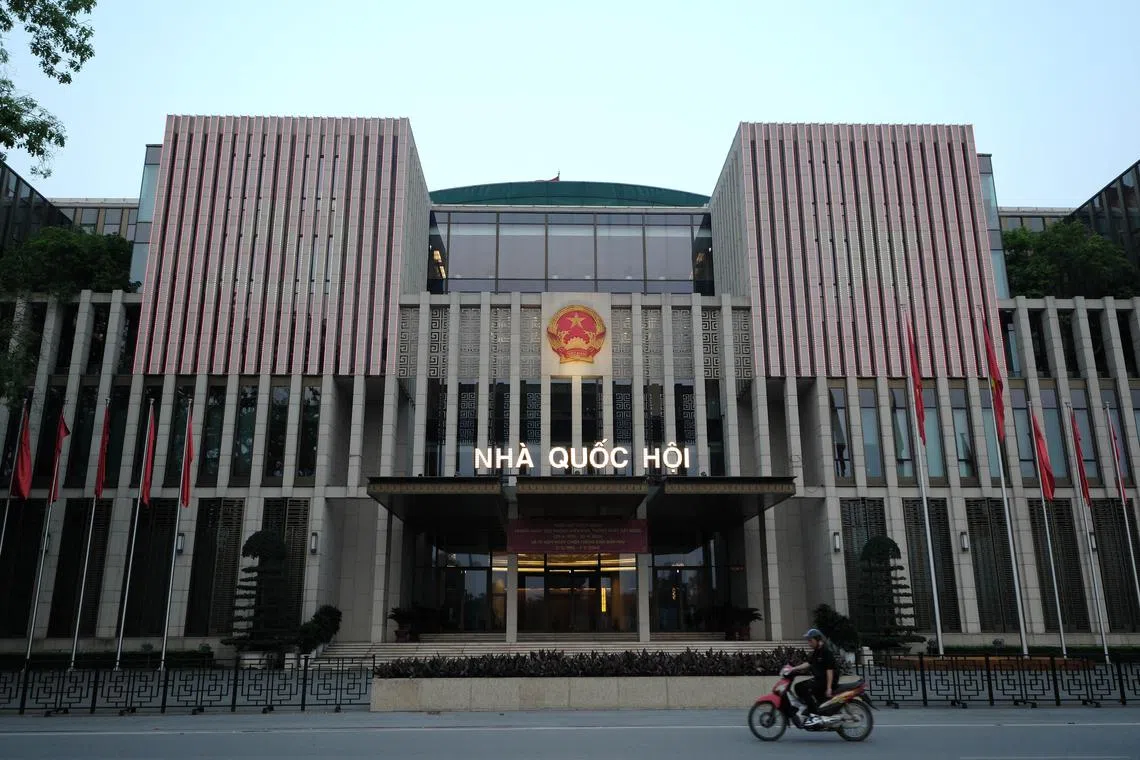Vietnam Parliament backs chairman’s resignation amid anti-bribery drive
Sign up now: Get insights on Asia's fast-moving developments

Mr Vuong Dinh Hue's departure leaves Vietnam with no permanent holders for two of its four top leadership positions.
PHOTO: EPA-EFE
Follow topic:
HANOI - Vietnam’s legislature approved on May 2 the resignation of its chairman Vuong Dinh Hue, it said in a statement, the latest top official to step down amid an intensifying anti-graft crackdown by the ruling Communist Party.
Mr Hue’s departure, which had already been announced last week by the party’s central committee,
Both Mr Hue, 67, and Mr Thuong, 53, were publicly accused of unspecified violations and shortcomings after corruption cases entangled people close to them or under their supervision.
Mr Thuong’s predecessor also had to quit in the middle of his term in 2023. None of them made any public comment in response to the accusations.
The resignations have been linked to a wide-ranging “blazing furnace” anti-bribery campaign, which was launched in 2016 by the now ageing general secretary of the party Nguyen Phu Trong.
The crackdown has intensified over the past two years, as the party moves closer to its five-yearly Congress and a reshuffle of its top positions in 2026.
The legislature appointed Mr Hue’s deputy Tran Thanh Man as his temporary replacement, according to state media.
Dr Man, 58, who holds a doctorate in economics, is also in the powerful Politburo, which now has only 13 of its 18 statutory members, following resignations linked to the anti-bribery drive.
Mr Hue had been touted as a possible candidate for the party’s general secretary position, Vietnam’s most powerful job. As head of Parliament, he was one of the four “pillars” of the country, together with the party chief, president and prime minister.
The National Assembly is set to hold a regular, month-long meeting from May 20, when it could appoint a new president and chair of the Parliament after the Communist party names them.
Foreign investment, corruption
Foreign investors, on which Vietnam is highly dependent, cite its political stability as a major draw, but the upheaval does not appear to have significantly changed their mood.
A survey from the European Chamber of Commerce conducted after the resignation of the president in March found that business confidence was rising.
Pledges of foreign investment slightly fell in March to US$1.9 billion (S$2.6 billion), according to Vietnam’s statistics office, but rose again in April to US$3.1 billion, driven by China and Hong Kong.
The impact of political turmoil is not immediate and may be hard to measure, said a Vietnam-based foreign consultant who declined to be named because the matter is sensitive in Vietnam.
Investors usually cite slower administrative procedures and reforms as possible negative outcomes of political turbulence and of the intensification of the anti-corruption campaign, but none questions the communist party’s grip on power.
For some investors fighting corruption is positive for business, although results of the campaign are unclear.
In some Vietnamese provinces, up to 80 per cent of citizens surveyed in a 2023 study co-sponsored by the United Nations Development Programme and published in March said they offered kickbacks to access public health services, while “bribes for employment in the public sector remain common”. REUTERS

